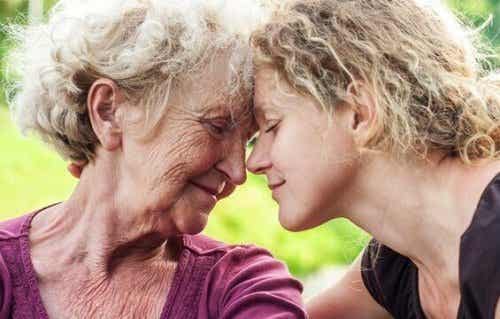
Last update: April 19, 2018
Sadness is part of our life and no one can escape. However, it is more likely to overwhelm us in some stages. One of these is that of the third age, that phase in which we begin to see youth as a distant horizon that falls further and further behind. Many wonder how you can help an elderly person who is sad and who feels trapped in this emotion, which becomes recurrent.
There are various reasons for experiencing sadness in old age. As in adolescence, the body suddenly changes and is out of our control. The relationship with the family and with the social context changes. Many stop working regularly at this stage of their life and others have to cope with the pain of losing their partner or friends and dreams that may never be fulfilled.
Helping an elderly person who is sad is not as complicated an intervention as it may seem in some cases. It is true that the physical limitations are greater, which in turn narrows the range of possibilities. However, the margin is usually large and there may be alternatives, plans and projects in it that can excite the person.Risk factors for depression
The best way to help someone who may be suffering from depression is to know about it the level of vulnerability e understand which factors can increase the risk. We keep in mind that in this vital moment the losses are usually frequent and the most exceptional winnings, contrary to what happens in childhood.
In the same way, some circumstances may increase the risk of suffering from depression during this stage of life. Among these we find above all:
- The state of health. If you have health problems, especially when they are chronic, the risk of depression is greater. Much more in cases of degenerative diseases or involving frequent physical pain.
- The personality. A person who is insecure or with low self-esteem is more prone to being overwhelmed by sadness in old age.
- The socioeconomic condition. Economic dependence or lack of means at this stage generates a greater risk of depression.
- Live alone.
- Having a poor social network or nothing.
If you know these risk factors, you can also identify the first clues to know how to help an elderly person who may be feeling sad. In the beginning, therefore, it is important to evaluate the risk factors, always with the person concerned, and seek adequate means to ward off a depression.
Helping an elderly person who is sad
Helping an elderly person who is sad does not mean taking responsibility for his sadness. A sad person does not need to be "adopted", even less pitied. Such an intervention requires motivation, affection, company and support. But above all, respect. It is therefore necessary to accept his times, his decisions, his preferences. Arguing, giving courage, but letting her decide. This way, any changes that occur will be more likely to persist over time.
Help, in addition to being better when it is intelligent and appropriate to the person, is also more positive when it comes from honesty and from the heart. When we do it because we care about that person and not because, for example, they stop bothering us.
What can be done to help an elderly person who is emotionally unwell? These are some measures:
- Invite her to remove negative thoughts so that her mood leads her to act in a positive way. Do it with love. If she tells you that she can no longer do anything right, ask her if you can do something to make this change. If she says she doesn't care, let her speak freely without arguing.
- Don't let him go a whole day doing nothing. Help her find small productive tasks with which she can feel useful.
- Incite positive feelings. Help her remember the good times, the successes, etc. Consult her opinion and let her know that you value her wisdom and her experience. Let her know that her opinion matters to you.
- Offer her stimuli that make her find activities that are rewarding for her, small as they are. A morning walk, reading, gardening, any activity is fine.
- Help her structure a routine. Sadness and depression sometimes cause you to spend a lot of time in bed or too many hours in front of the television. We can sit down with the older person and reorganize her routine together. However, we can propose, but it will be you who will have to have the last word. If not, we should do constant supervisory work for it to be productive.
Knowing how to grow old is a process in which there are usually complicated moments on an emotional level. We achieve a lot when we discover that supporting those who are most vulnerable is also a way to feel good about ourselves, fill our life with meaning, and give more meaning to ourselves.
*Note: sadness, in the strict sense of the term, is an emotion and as such cannot last long over time. In this article, with the word sadness we refer more than anything else to a state in which melancholy, frustration and sadness itself predominate, rather than emotion itself.


























